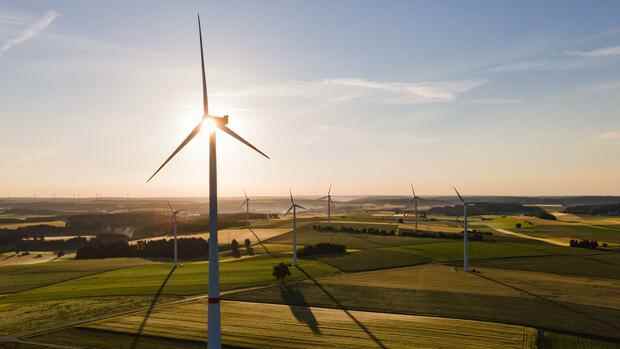The federal government wants to switch to renewable energies.
(Photo: dpa)
Robert Habeck took up office as Minister for Climate and Economic Affairs in order to fundamentally restructure the German economy in the coming years. Sven Giegold, State Secretary in Habeck’s team, explained in a guest article for the “Financial Times” what is at stake: “In the medium term, Germany will switch completely to renewable energies and thus become the global climate leader. The Greens are responsible for the super ministry for economy and climate, which will oversee the final phase of the German transition to 100 percent renewables.”
In view of the fact that the share of renewables in the electricity supply in 2020 was around 45 percent and in total final energy consumption was 19 percent, one has to understand this in such a way that the Greens assume that they will govern at least until the end of the decade.
Realistically, however, the conversion should take significantly more time, as electricity consumption will increase significantly in the coming years due to the restructuring of the economy.
The way in which Giegold intends to achieve these goals gives cause for concern: “The role of the state should go beyond creating a regulatory framework. The state must support private companies to innovate by (…) supporting innovation within the framework of an active industrial policy.”
Top jobs of the day
Find the best jobs now and
be notified by email.
What sounds good at first is actually a commitment to government control of the economy. Giegold emphasizes that the ministry does not rely on the effect of price signals such as the CO2 price, but on clear government guidelines, combined with regulation of the financial markets, in order to create a “stable investment climate”.
Does Giegold mean government credit control?
It is reasonable to assume that this means government credit control, as is already emerging today with the introduction of the taxonomy that divides investments into “good” and “not good”.
Daniel Stelter is the founder of the discussion forum beyond the obvious, which specializes in strategy and macroeconomics, as well as a management consultant and author. Every Sunday his podcast goes online at www.think-bto.com.
(Photo: Robert Recker/ Berlin)
In this way, it is easy for politicians to override the most important mechanism of the market economy, the allocation of capital. This approach is already leading to strange results: for example, companies involved in defense are struggling to raise capital due to environmental, social standards and good corporate governance (ESG) requirements, while at the same time the EU wants to strengthen its military capabilities.
From the political point of view, the charm of the taxonomy lies in the fact that it does not intervene visibly. Indirectly and under the cloak of a good cause, what is politically opportune is promoted, often garnished with the term “democratic legitimacy”.
The focus is not on increasing the production potential of the national economy, but on realizing political goals. The sad result: lower growth, higher inflation and less prosperity.
More: Building and transport sector missed 2021 climate targets.
